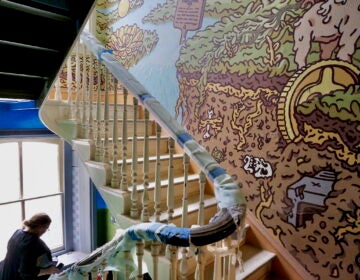Germantown Settlement’s Emanuel Freeman a no-show for court ordered deposition
The longtime president and executive director of two of Germantown’s most influential organizations Tuesday refused to appear for a court ordered examination, claiming schedule conflicts and lack of adequate legal representation.
“This communication is to inform you that I am unavailability [sic] to attend an examination meeting concerning Germantown Settlement and Greater Germantown Housing Development Corporation scheduled for July 26, 2011,” read a letter signed by Emanuel Freeman, which the U.S. Trustee for the Settlement bankruptcy case received Monday.
Tuesday was supposed to be a big day for Germantown. On June 9 Irv Ackelsberg, legal counsel for the community group Germantown Community Connection, convinced a federal judge that holding today’s deposition of Freeman would be essential to finally determining the real remaining assets of Settlement and GGHDC, which have both been ordered to close their doors and liquidate their holdings to pay off millions in unpaid debt.
In front of Judge Stephen Raslavich, Ackelsberg argued that Freeman repeatedly misrepresented company assets to the court during bankruptcy proceedings and appeared to still be collecting rent from some properties built or purchased by GGHDC, a publicly funded entity, using as many as 16 subsidiary companies that are not in bankruptcy.
Ackelsberg argued that these subsidiaries could be sheltering and controlling GGHDC assets that should have been included in the case.
Public funds flowing to the Settlement family of agencies over the more than 20 years the politically connected Freeman controlled them totaled as much as $100 million. In that time, federal and school district audits and investigations of the Settlement agencies exposed missing funds on federal projects and other highly questionable accounting practices and conflicts of interest. This lead to the closing of Germantown Settlement Charter School and the HUD ordered foreclosure of two low income senior housing facilities in Germantown and finally a cessation of all city funds to the agency.
Settlement, GGHDC and the Greater Germantown Education Development Corporation, which ran the school, filed for bankruptcy in 2010, on the eve of several foreclosure actions against large Germantown properties they owned.
According to court records, Freeman controlled between 30 and 60 buildings, mostly residential and commercial rental properties, amounting to between 200 and 400 rental units.
Over the last several months some of those properties, like a large commercial complex at Wayne and Chelten avenues in Germantown and the school campus have been sold at sheriff’s sale and are no longer controlled by Freeman.
But other properties remain in question, like an estimated 30 scattered site houses built or renovated with state, federal and city funds by subsidiary companies like the Lower Germantown Limited Partnership and the Lower Germantown II Limited Partnership and others, which were created in the 1990s by Freeman and the current real estate advisor to City Council, and former Redevelopment Authority chief Herbert Wetzel.
Wetzel has since denied current involvement with these companies.
Freeman attempted to use the Lower Germantown Limited Partnership to buy the commercial property a Wayne and Chelten prior to its sheriff’s sale this year, but the court did not see it as an arms length transaction.
This was one of the examples Ackelsberg used to illustrate the need for a direct examination of Freeman – he wanted to determine if the cash the Lower Germantown partnership would use in a action like Freeman proposed should have been included as an asset in the bankruptcy cases.
In Freeman’s letter to U.S. Trustee Terry Dershaw, he claimed he did not have the money to hire an attorney to represent him. Freeman also said that he had already turned over all the information he had to give about GGHDC and that any remaining documents pertaining to the social service agency Germantown Settlement were locked inside the Burgess Center, the building on Wayne and Chelten, which is now controlled by a New Jersey bank that owned the original mortgage.
But on Saturday, April 9 at around 9 p.m., just days after the Burgess Center was sold at sheriff’s sale to that New Jersey bank, a Wendy’s customer saw Freeman and another man removing furniture and boxes from the building, and he later saw them deposit the same haul into a vacant storefront in the Freedom Square strip mall on the 5000 block of Germantown Avenue, which is controlled by Freedom Square Inc., another company created in 1990 by Freeman and Wetzel.
NewsWorks obtained photographs of as many as 30 boxes stored at that location later in April, at least one appears to be addressed to GGHDC, and several were marked “truancy.” Truancy prevention was one of the last programs Germantown Settlement ran for the city before its funding cutoff in June of 2009.
Ackelsberg planned Monday to file a motion holding Freeman in contempt of court.
Emanuel Freeman could not be immediately reached for comment.
WHYY is your source for fact-based, in-depth journalism and information. As a nonprofit organization, we rely on financial support from readers like you. Please give today.




